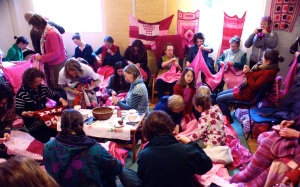Language can have a huge impact on people’s feelings. As a bard or as a ritualist it can be tempting to go for the most emotionally affecting language you can use in order to light fires under people. However, if the language you use doesn’t reflect who you are or what you do, then that disconnection can undermine your efforts and even push people the wrong way.
Protest is a good topic for consideration here. There’s nothing like a good, rousing song to unite people and get them all fired up. However, a protest song can turn out to be nothing more than a feel good activity. We loudly sing the chorus about how we’re going to change the world and then we go home feeling victorious while having achieved nothing. It’s not enough to have a protest song be a set of good ideas, if it doesn’t beget change, it hasn’t worked.
Do They Know It’s Christmas is a case in point. The song itself is pretty awful when you read the lyrics (and if you haven’t, you should). It’s condescending, and the narrative of poor unfortunate Africa is laced through it. Justice would involve some recognition of what other countries have done to exploit and harm African countries. Wealthy people encouraging poor people to donate to help other poor people isn’t about the creator walking their talk. Charity just puts band aids on massive systemic problems when what we need to be doing is making radical practical changes.
If you can’t back up your protest song, it isn’t that effective. If, on the other hand, your protest song comes out of years of protesting, it’s going to have a lot more weight. Songs about what you did carry energy into new situations. It’s no good writing songs about justice if, when it comes down to it you’ll look the other way. All too often, when successful people write about struggles, what they do is other their subjects, speak over them, deny them agency, patronise them and encourage pity. Streets of London is a case in point here.
If you are writing songs about issues, then it is important to care more about the issue than you do about how good you’re going to look when talking about the issue.
When we write, we make things up – it’s true in any non-fiction genre and there’s nothing problematic about that. Making things up is good, and can be a powerful and more direct way of getting ideas across. However, there is a lot of difference between making up a story within a song, or as a book, and making up a story about the kind of person you are. If there’s nothing authentic underpinning your bardic work, then the odds are you’re just trying to elevate yourself. If what you write comes from somewhere real, it doesn’t matter how fantastical the creation is, the truth of it will ring out. I’m thinking of Nils Visser’s Wyrde Woods books here as a fine case in point – lots of fantasy elements, and a lot of powerful social realism underpinned by experience.
If you want to write about issues as a bard, it’s important to develop a real and substantial understanding of those issues, and to be engaged with change making. The world does not need another song about how sad homelessness is, nor does it need any more anthems designed to make people feel good about changes they aren’t actually making.





